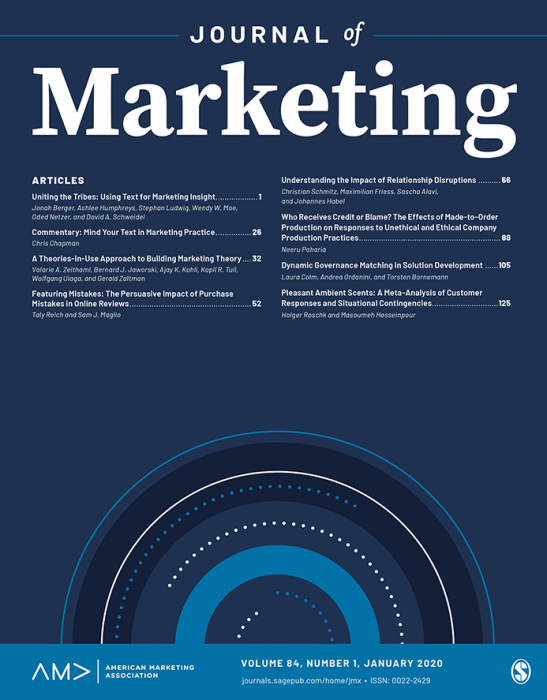之前还是之后?“随付随付”情境下支付决策时机的影响
IF 11.5
1区 管理学
Q1 BUSINESS
引用次数: 2
摘要
本研究研究了在按需付费(PWYW)定价下,支付决策时间(产品交付之前和之后)是如何影响消费者支付的。作者关注的是消费者在收到产品之前和之后对产品的不确定性变化最小的情况。理论发展表明,当产品价值较高时,人们在获得产品后(相对于获得之前)支付更多,但当产品价值较低时,这种影响会减弱,当产品价值足够低时,这种影响会逆转。实验室实验和现场实验的结果支持了理论预测,初步证明了产品价值的调节作用。在线实验证明了高产品价值下的预测支付决策时机效应和低产品价值下的预测支付决策时机效应的反转。另一个在线实验通过考察慈善捐赠背景下的PWYW交易(作者将其标记为“贡献你想要的”)扩展了先前研究的范围:作者获得了高产品价值预测支付决策时机效应和低产品价值效应缓解的证据,以及理论机制的过程证据。这项工作对企业(包括非营利组织、社会企业和慈善机构)的PWYW计划管理具有启示意义。本文章由计算机程序翻译,如有差异,请以英文原文为准。
Before or After? The Effects of Payment Decision Timing in Pay-What-You-Want Contexts
This research studies how payment decision timing—before versus after product delivery—influences consumer payment under pay-what-you-want (PWYW) pricing. The authors focus on situations where there is minimal change in consumer uncertainty regarding the product before versus after receiving it. The theoretical development suggests that people pay more after (vs. before) receiving the product when product value is high, but the effect is mitigated when product value is low and reversed when product value is sufficiently low. Results from a laboratory experiment and a field experiment lend support to the theoretical predictions, with preliminary evidence for the moderating effect of product value. An online experiment demonstrates the predicted payment decision timing effect at high product value and a reversal of the effect at low product value. Another online experiment extends the scope of the previous studies by examining PWYW transactions in a charitable donation context (which the authors label “contribute what you want”): the authors obtain evidence for the predicted payment decision timing effect for high product value and a mitigation of the effect for low product value, as well as process evidence for the theoretical mechanism. This work has implications for the management of PWYW schemes for firms, including nonprofits, social enterprises, and charities.
求助全文
通过发布文献求助,成功后即可免费获取论文全文。
去求助
来源期刊

Journal of Marketing
BUSINESS-
CiteScore
24.10
自引率
5.40%
发文量
49
期刊介绍:
Founded in 1936,the Journal of Marketing (JM) serves as a premier outlet for substantive research in marketing. JM is dedicated to developing and disseminating knowledge about real-world marketing questions, catering to scholars, educators, managers, policy makers, consumers, and other global societal stakeholders. Over the years,JM has played a crucial role in shaping the content and boundaries of the marketing discipline.
 求助内容:
求助内容: 应助结果提醒方式:
应助结果提醒方式:


